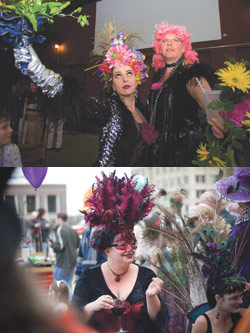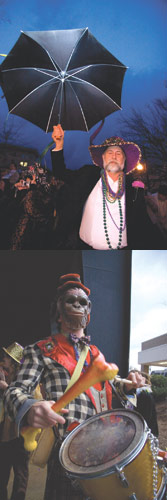Asheville has, by some accounts, become a haven for New Orleans ex-pats. Perhaps it’s a shared enthusiasm for dressing in costumes. Or a love of great music and a lot of dancers. Or maybe it’s a sense of community—that ethereal, much-lauded and oft-coveted state—that pervades both places.

So Mardi Gras culture has seeped into Western North Carolina. The festivities started a few years back as a loose collection of ecstatically attired revelers making their way from pub to pub. The celebration now boasts a street parade (permits and all!) and a bona fide zydeco ball.
“When people leave New Orleans, it’s like weaning yourself from an addiction,” says ex-pat Lesley Groetsch with a laugh. “Anything you can do to recreate some of it … It’s so depressing to be away during Mardi Gras, you just feel like you have to do something.”
Groetsch, with husband Jack Groetsch, and Chris and Ashley Jones brought the bons temps with them when they relocated: The Groetschs to run The Orange Peel, and the Joneses to open Thibodaux Jones (the Cajun joint inside Grey Eagle that later moved to Biltmore Avenue).
Together they started the Mystic Krewe of Munky Doux. The name came from Chris Jones, Groetsch relates.

“He was taking a shower and it came to him,” she says. “He thought of monkey spelled munky, like funky, and doux like roux [the basis of all Cajun cooking].”
The Munky Doux krewe still gets around—Saturday they’ll be out at Jack of the Wood. Tails are recommended.
But it’s the Mystic Mountain Krewe who put together the street parade. Last year was the first run—this year will be even bigger, organizers say.
“It was short, but gosh we had so much fun. The people watching, they loved it,” said Susan Sertain, who runs the Costume Shoppe and helped organize the street parade.
Also part of the backstory: A transplant longing for the parties of her former town met the wife of Asheville’s wildly popular New Orleans jazz band. And they all got organized.
Where to laissez les bons temps rouler
• Meet-and-greet for parade krewes: Krewes get together for final details, rundowns, socializing. Thursday, Feb. 19. BoBo Gallery.
• Pub crawl with the Mystic Krewe of Munky Doux: Saturday, Feb. 21. 6 p.m. Jack of the Wood pub. Zydeco band Bayou Diesel will play.
• Street parade followed by Mardi Gras ball: Sunday, Feb. 22. “Riches to Rags”-themed parade begins outside the former Joli Rouge across from City County Plaza) at 4:37 p.m. and ends at Pritchard Park. www.myspace.com/mysticmountainkrewe. Ball is at The Grey Eagle featuring Cajun/Creole music from Carolina Gator Gumbo and a buffet from Twin Cousins kitchen. 7 p.m. Dance lesson at 6:30 p.m. $15.
• Fat Tuesday benefit party for New Orleans: Event featuring music, film and education. Tuesday, Feb. 24. Asheville Pizza and Brewing Company, Coxe Ave. Music by Bayou Diesel from 4 to 6 p.m. Screening of trailer for Chris Bower’s documentary We Won’t Bow Down about the Mardi Gras Indians, from 6:30 to 7:15 p.m. Learn more about the Fundred Dollar Bill project, a nationwide campaign to support lead recovery in New Orleans, from 7:15 to 8 p.m.
• Mardi Gras Moulin, a night of burlesque, live music, bawdy belly dance and sideshow stunts. Tuesday, Feb. 24. 8:30 to 11:30 p.m. $15. Mo Daddy’s. Live music after party at 10:45 p.m. is $5. www.sideshowburlesque.org.
“When I moved to Asheville from California, I brought with me one couch, a couple of chairs, some clothes and my Mardi Gras costumes,” says Carol Pimentel, who had been heavily involved with the notorious Mardi Gras celebrations in (where else?) San Luis Obispo, Calif. “I said this has got to be a place that has Mardi Gras zanies somewhere.”
See, you don’t have to know everything about New Orleans (many of the revelers have never been to the hallowed ground)—you just have to love a great party, and a chance to get decked out in feathers, face paint and tutus.
“It’s all about fantasy and creativity and community and family and fun,” says Pimentel, who loved playing dress-up as a kid.
You don’t have to know everything about New Orleans, but it helps to know a bit about the traditions (see sidebar). In case, say, you’re eating a piece of cake at the Twelfth Night celebration and you find a plastic baby in it. Tada! The king has been found.
That’s what happened to Moksha Gita, who only days before had been crafting the scepters for the then-unknown royal couple out of fabric, foam and beads. He got the baby, he became king, he chose Margeaux Miller for his queen, and so they reigned.
The novice’s guide to Mardi Gras traditions
Recognizing that some Western North Carolina residents may be Mardi Gras amateurs, Xpress asked former New Orleans resident Lesley Groetsch to explain some of the traditions. We also consulted Wikipedia.
• What is Mardi Gras? In its strictest sense, “Mardi Gras” means “Fat Tuesday” in French, and it’s the day before Ash Wednesday (the last day for Catholics to indulge before Lent). These days, “Mardi Gras” can refer to the entire season between Epiphany (the 12th day of Christmas) and Ash Wednesday, when Lent begins—a time of discipline and reverence.
• What is a krewe? Loosely, any Mardi Gras organization. In New Orleans, some are social-aid-and-pleasure clubs that hold events throughout the year. In Asheville, the krewes are a bit more informal. Each krewe has a king and queen.
• How are the king and queen chosen? For the Mystic Mountain Krewe, whoever finds the plastic baby in the king cake becomes the king, and then chooses his queen. Other krewes have different methods. The Mystic Krewe of Munky Doux, for example, has a secret method.
• What is a king cake? Traditionally, a king cake is cinnamon-filled dough baked into a ring shape, glazed with multicolored frostings and sprinkled with sugar in the colors of Mardi Gras. In New Orleans, whoever finds the baby (or the bean, or the trinket, as the case may be) buys the next cake, and dozens of king cakes are eaten throughout Mardi Gras season.
• What do I wear to a Mardi Gras event? Formal krewes have themes (Asheville’s parade theme this year is “Riches to Rags”). Wear something garish, funky and crazy—often people wear the traditional colors of purple, green and yellow. Wear a mask, or if you’ve come to be part of Munky Doux, a tail.
“It was quite odd having people bow to me all night. I was sort of like, OK, enough bowing,” Gita says of that January event. The next day, he went to Usual Suspects for lunch. “I walked in, and I was like, ‘I’m the king!’ and no one bowed at all. It was a humbling experience.”
In Asheville, the requirements for being king may include supremely crazy attire and an awesome mustache (such as the exciting handlebar sported by last year’s king, Scott Yerkey, who works at City Bakery, if you want to check it out).
And, notes Gita, “You have to drink a lot.”
More than that, though, it’s about (again) community. While Gita helped Jim Lauzon of LaZoom Tours work on the now-beloved purple bus, Lauzon told him stories of what Mardi Gras in New Orleans was like.
“One thing I thought was really beautiful, he talked about how it’s this day where everybody comes out of their homes, everyone’s on the street, all the doors are open,” Gita says. “That kind of community celebration, the whole vision of that is amazing to me.”



Before you comment
The comments section is here to provide a platform for civil dialogue on the issues we face together as a local community. Xpress is committed to offering this platform for all voices, but when the tone of the discussion gets nasty or strays off topic, we believe many people choose not to participate. Xpress editors are determined to moderate comments to ensure a constructive interchange is maintained. All comments judged not to be in keeping with the spirit of civil discourse will be removed and repeat violators will be banned. See here for our terms of service. Thank you for being part of this effort to promote respectful discussion.